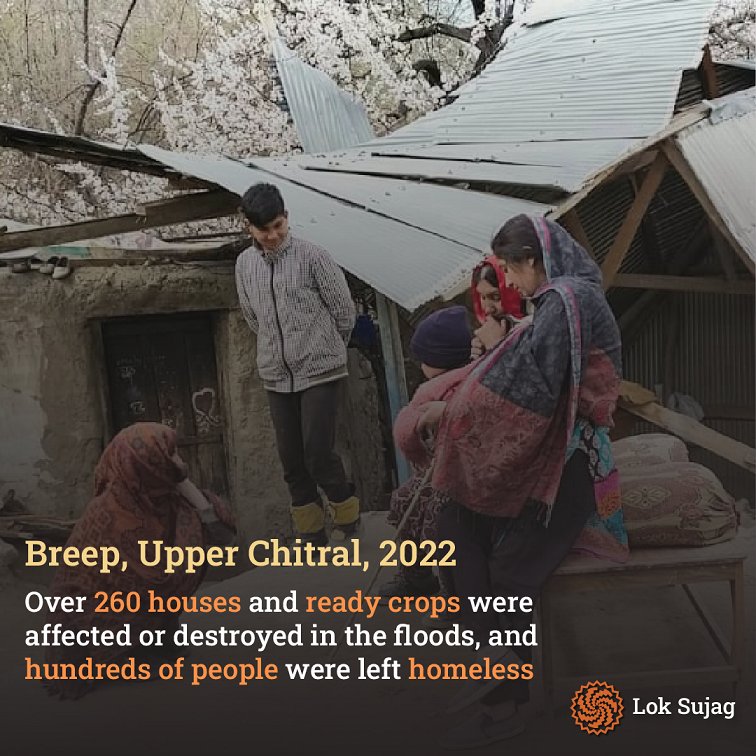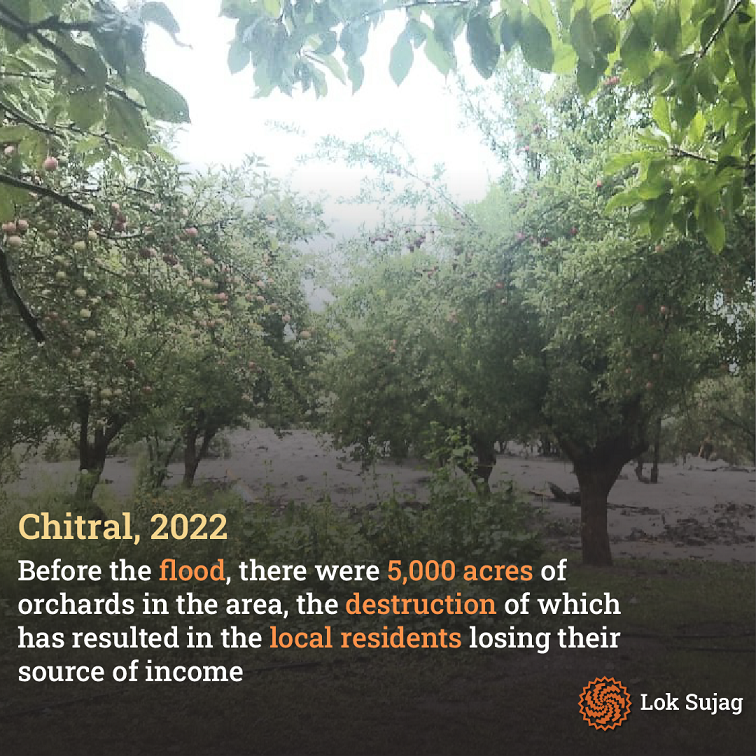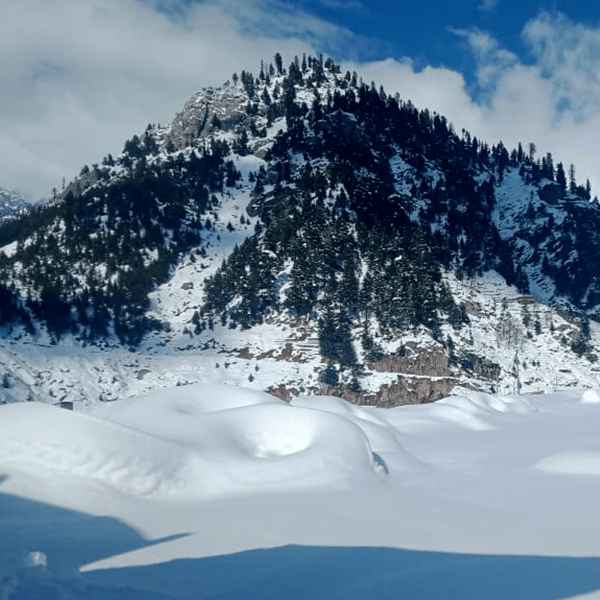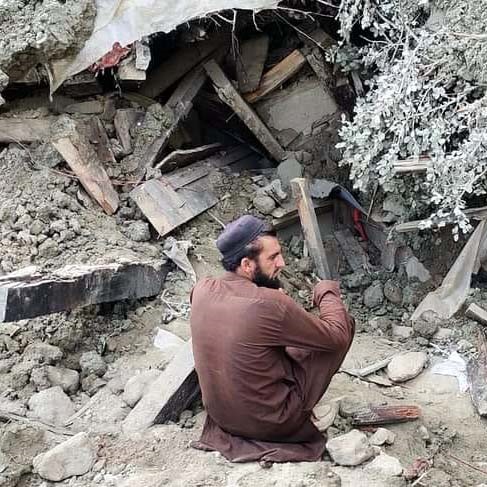It has been eleven months since the devastating floods struck Chitral, yet the disaster continues to affect thousands of people, impeding their recovery. A similar situation persists in the Breep area of Chitral, compelling hundreds of individuals to live in makeshift huts.
Liaquat Khan, a retired lecturer and President of the Cooperative Farms Services Centre Chitral, migrated from Breep with his family after the flood destroyed his business. He is now residing in Chitral City.
Khan says that the Chikan Goll Canal, which passes through the area, was flooded due to a glacier outburst the last summer.
The floods destroyed ripe crops and caused the displacement of hundreds of people, as they wrecked over 260 houses. Moreover, they ravaged 17 acres of apple orchards and 59 acres of cherry and potato fields, along with roads, schools, mosques, dispensaries, shops, congregations and water channels. These areas still await restoration, resulting in the cessation of agriculture and employment opportunities in the region.
“The Aga Khan Agency for Habitat is constructing shelters for displaced people at Kutan Lashist and Barrel Leap, located just a few kilometres (km) away from Breep village. However, the project remains incomplete at this time,” says Khan.
The Breep village of Mastoj Tehsil in the Upper Chitral district is called the gateway to Yarkhun Valley. Situated close to the Wakhan border, it lies 75 km away from the district headquarters of Boni and 140 km away from Chitral City.
As per Musa Nabi, the Chairman of the local village council, Breep is home to 832 families, comprising a total population of 5,482 individuals, predominantly belonging to the Ismaili community. Despite facing poverty, most of the residents in this area are educated and maintain a peaceful demeanour.
Breep and Nawah lack any factories, with the local economy and employment opportunities revolving around agriculture. Farmers cultivate crops such as maise and wheat, although most of their livelihoods rely on plantations.
Consequently, all the fruits in this region, such as apricots, cherries, and potatoes, are succulent. Among them, apples hold a special status as a cherished offering from Breep. Their exceptional sweetness and delectable flavour are so renowned that former president Pervez Musharraf ordered apples from this area for himself and his acquaintances.
Islamul Haq, the Director of the Agriculture Department in Upper Chitral, states that the area previously had five thousand acres of orchards before the flood. Owners of one Kanal apple orchard used to generate earnings ranging from Rs50,000 to Rs80,000, which is different now.
Farman Nazar Umar, a 42-year-old resident of Breep, states that most of the land in the orchards has become barren, agriculture has been destroyed, and the part of the road that was swept away by the river in last year’s floods has not yet been repaired. In such circumstances, it is not possible for him to even send his children to the fruit market to sell their harvested fruits.

After retirement, Liyaqat Khan started a business in Breep, but due to the floods, his shopping centre, tuck shop, petrol pump, and six-Kanal orchard gardens were all washed away. He has been unable to start any new venture as yet.
Khan explains that after the flood, the then chief minister, Mahmood Khan, visited the area and announced a payment of 25 crore rupees for the rehabilitation of the affected regions in Upper Chitral, along with compensation for the losses. However, apart from the two and a half lakh rupees given to twenty-two houses, no one else received anything.
Assistant Commissioner of Mastoj, Shah Adnan, confirms that he did not receive the amount the former chief minister announced. He says compensation has been provided to six to seven hundred houses across the district while investigations are ongoing for hundreds of pending requests.
Saraj Al-Nisa, a 42-year-old local, actively participates in social activities. She states that during the flood, private properties, utility stores, mosques, three community halls belonging to the Ismaili community, and a girls’ high school suffered severe damage. However, until now, no government institution has paid attention to their rehabilitation.
“The government should take steps to rehabilitate our destroyed houses, properties, crops, and orchard lands so that we can sustain our children’s livelihood by having a home to live in,” she says.

The affected individuals are compelled to protest continuously to seek compensation for their losses. Within just one month in Breep, men and women from dozens of villages, along with their children, staged demonstrations twice.
During this period, the entire area observed a complete shutdown, and the protesters blocked the Yarkhun-Boroghil Road.
Floods had never occurred here before 2005. In 2015 and 2018, there were minor breaches in both streams of the area, but the damage was not significant. However, last year’s floods wreaked havoc on a large scale.
Liaquat Khan says that the mountains in this area consist predominantly of soil rather than stone; the glacial runoff erodes the banks of the Chikan Goll Canal. To ensure the preservation of the village and road, it is imperative to construct a protective barrier or wall.
Mir Rahim, a 64-year-old social worker belonging to the Ismaili community, is the president of the ‘Breep Cluster,’ a group comprising various agricultural organisations. He states that around five hundred families from his community are settled along the canal.
“Every year, water enters their houses. The local residents have been demanding canal cleaning and fortification of its banks from the government for the past twenty years, but no one pays heed,” says Rahim.
Also Read

Global warming comes home to Upper Dir: 'Climate Change is causing destructive flash floods and deadly landslides'
Ambrin Bibi, a mother of four children, is also among those affected by the last year’s floods. She states that the government is not paying attention to the protection and rehabilitation of the affected individuals. There is a renewed risk of another flood in July. She says this area is no longer habitable, so they should be relocated to a safe place.
On the other hand, Adnan Shah claims that the Irrigation Department will soon initiate work on cleaning the canal and strengthening its banks.
The non-governmental organisation Aga Khan Agency for Habitat is actively engaged in social welfare work in this area. According to their Regional Program Manager, Nazir, efforts will be made to commence cleaning the canal from the current month so that people do not suffer losses in future floods.
The additional Assistant Commissioner of Mastoj had also assured the affected individuals last month that the administration would promptly address their crucial concerns regarding rehabilitation. Although the protestors temporarily opened the road, they are now issuing threats of resuming protests if they do not witness a reduction in their problems.
Published on 13 Jul 2023



















